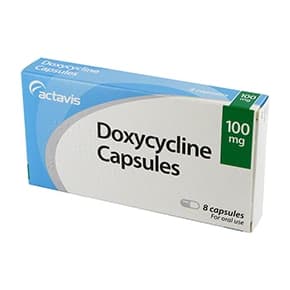- Private & confidential service
- Genuine medication
- All-inclusive service - No hidden fees
- Next day delivery
- STIs
- Chlamydia
Chlamydia: start your consultation
- 1. Answer the online medical questions
- This helps our doctors to decide which treatment is safe for you.
- 2. Select your treatment
- You will see a list of recommended treatments. You can select the one you prefer.
- 3. Checkout and delivery
- Once you’ve completed the checkout, our doctors will review your answers. If all is safe, you will receive your treatment tomorrow.

- Second-line treatment for STIs
- Short-term application
- Used to treat chlamydia, NSU and ureaplasma

- Treats various STIs
- Effective for acne and malaria
- Easy-to-take capsules

- Convenient at-home test kit
- Discreet and easy to use
- Accurate and quick results
Chlamydia
Chlamydia is the most common sexually transmitted infection (STI) in the UK, due to the fact that the majority of cases are symptomless (asymptomatic). If left undiagnosed or untreated, a chlamydia infection can result in long-term health problems, including infertility.
You can read more about the causes, symptoms, and treatments below. We offer a treatment service that is discreet and includes free next-day delivery - meaning that you can get cured without a visit to the doctor.
Topics
What is chlamydia?
Chlamydia (chlamydia trachomatis) is a sexually transmitted infection that most commonly affects people aged 15-24. Like all STIs, it is passed on through unprotected sex (when you don’t wear a condom or other barrier method of contraception).
Most people who become infected with chlamydia do not experience any signs of infection. In fact,
As chlamydia is so frequently asymptomatic, it’s vital that sexually active people get regular STI checks. Otherwise, the condition can be spread to many other people unknowingly.

If you do test positive for chlamydia, it can be easily treated with antibiotics.
However, if you have undiagnosed chlamydia for a long period of time, certain health complications may arise.
What causes chlamydia?
Chlamydia is a bacterial STI, meaning that it is caused by a type of bacteria which is spread during sexual intercourse.
You can catch chlamydia through any of the following (as long as your partner has a chlamydia infection):
- unprotected vaginal sex
- unprotected anal sex
- unprotected oral sex
- the sharing of sex toys (without cleaning in between uses)
- genital touching (without penetration or ejaculation)
- semen or vaginal fluid getting into the eye
Because the bacteria live in the mucous membranes of the vagina, penis, rectum, and mouth, they are easily spread through bodily fluids.
What doesn’t cause chlamydia?
There exist some misconceptions about how you can catch chlamydia. You cannot catch chlamydia from:
- a toilet seat
- kissing
- hugging
- sharing towels
- swimming pools / hot tubs
- sharing cutlery or straws
Can you get chlamydia without having sex?
You can still catch chlamydia from an infected partner without having penetrative or oral sex.
If your genitals come into contact with each other, the bacteria can be transferred and develop into an infection.
What are the symptoms?
Whilst the majority of chlamydia cases are symptomless, about 30-50% of people will experience some signs of infection.
If you notice any of the following, and you’ve recently had unprotected sex, we highly recommend that you get screened at a sexual health clinic as soon as possible.

Symptoms in women
- changes in vaginal discharge
- bleeding in between periods or after sex
- mild lower abdominal pain
- a burning sensation when urinating
Symptoms in men
- a burning sensation when urinating
- discharge from the penis
- painful testicles
Can chlamydia spread to other parts of the body?
In some cases, chlamydia can spread to other parts of the body, including the:
- throat and mouth (oral chlamydia)
- eyes
- rectum
Oral chlamydia, although rare, can cause symptoms like a sore throat.
If you end up with an anal chlamydia infection, you might experience pain, discharge, or bleeding from the anus and/or rectum.
What are the effects of chlamydia?
Because chlamydia is so difficult to diagnose, it can sometimes go undetected for months or even years. Despite it being an easy infection to treat, chlamydia can have serious long-term effects on your health and fertility if left untreated.
Long-term effects
The following table outlines the potential long-term effects of untreated chlamydia:
| Long-term effects | |
|
Female: |
|
|
Male: |
|
Chlamydia in pregnancy
Chlamydia can also cause complications during pregnancy and birth. If you have a chlamydia infection whilst you are pregnant, the chances of your waters breaking early are increased - meaning that your baby is more likely to be born prematurely.
A pregnant woman with chlamydia can also pass the infection onto her baby during birth, which puts the baby’s health at risk.
Fortunately, some chlamydia tablets are safe to use during pregnancy, so it is possible to eliminate these potential health risks.
How is chlamydia diagnosed?
The only way of knowing you have chlamydia for certain is by taking a test. Testing for chlamydia is quick, easy, and painless. You can get tested for free at any sexual health clinic, GP surgery, or genitourinary medicine (GUM) clinic.
If you are under 25 and sexually active, it’s recommended that you get tested at least once a year - especially if you are seeing new partners and aren’t using condoms.
How to get tested for chlamydia
A chlamydia test involves either:
- taking a urine sample
- taking a swab from your genitals
You can also purchase home chlamydia tests, which involve sending your sample off to be analysed in the post.
How can I treat chlamydia?
Chlamydia is easily treatable. You can get rid of your infection with a course of antibiotics. Usually, your doctor will prescribe a 2-week course of Doxycycline, as this is the first-line treatment. If for whatever reason Doxycycline is unsuitable for you, you may be prescribed Azithromycin instead.
1 tablet should be taken every day, preferably in the morning. Remember to finish all the pills in the pack - if you don’t take the whole course of antibiotics, your chlamydia infection can come back.
Can chlamydia go away on its own?
Chlamydia infections will not go away by themselves. You must take antibiotics to get cured.
If you leave a chlamydia infection, you put yourself at risk of developing more serious health complications.
How can I prevent chlamydia?
Preventing the spread of chlamydia can be done by using a barrier method of contraception, like a condom or dental dam. It’s important to keep the condom on at all times, even during oral sex.
| Ways to prevent chlamydia: |
|
Can I buy treatment online?
Here at HealthExpress, you can access chlamydia tablets online - so you can get treatment without going to the doctor.
Simply answer a few online medical questions to complete your free consultation. Your answers will be reviewed by one of our UK doctors, and if you are approved for treatment, your tablets will be sent out to you with free next-day delivery.
medical form
medication
prescription
from pharmacy

